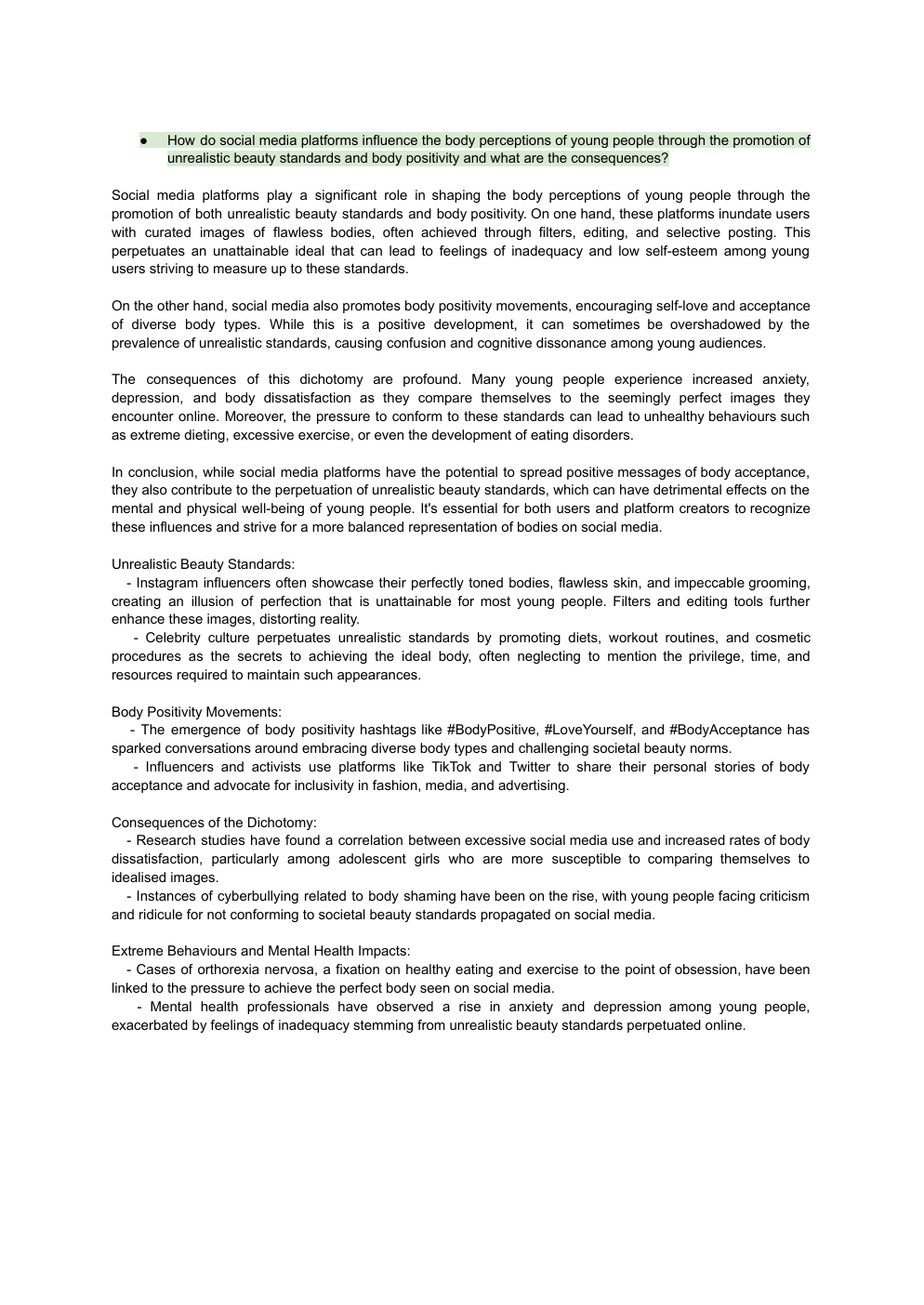How do social media platforms influence the body perceptions of young people through the promotion of unrealistic beauty standards and body positivity and what are the consequences?
Publié le 16/04/2024
Extrait du document
«
●
How do social media platforms influence the body perceptions of young people through the promotion of
unrealistic beauty standards and body positivity and what are the consequences?
Social media platforms play a significant role in shaping the body perceptions of young people through the
promotion of both unrealistic beauty standards and body positivity.
On one hand, these platforms inundate users
with curated images of flawless bodies, often achieved through filters, editing, and selective posting.
This
perpetuates an unattainable ideal that can lead to feelings of inadequacy and low self-esteem among young
users striving to measure up to these standards.
On the other hand, social media also promotes body positivity movements, encouraging self-love and acceptance
of diverse body types.
While this is a positive development, it can sometimes be overshadowed by the
prevalence of unrealistic standards, causing confusion and cognitive dissonance among young audiences.
The consequences of this dichotomy are profound.
Many young people experience increased anxiety,
depression, and body dissatisfaction as they compare themselves to the seemingly perfect images they
encounter online.
Moreover, the pressure to conform to these standards can lead to unhealthy behaviours such
as extreme dieting, excessive exercise, or even the development of eating disorders.
In conclusion, while social media platforms have the potential to spread positive messages of body acceptance,
they also contribute to the perpetuation of unrealistic beauty standards, which can have detrimental effects on the
mental and physical well-being of young people.
It's essential for both users and platform creators to recognize
these influences and strive for a more balanced representation of bodies on social media.
Unrealistic Beauty Standards:
- Instagram influencers often showcase their perfectly toned bodies, flawless skin, and impeccable grooming,
creating an illusion of perfection that is unattainable for most young people.
Filters and editing tools further enhance these images, distorting reality. - Celebrity culture perpetuates unrealistic standards by promoting diets, workout routines, and cosmetic procedures as the secrets to achieving the ideal body, often neglecting to mention the privilege, time, and resources required to maintain such appearances. Body Positivity Movements: - The emergence of body positivity hashtags like #BodyPositive, #LoveYourself, and #BodyAcceptance has sparked conversations around embracing diverse body types and challenging societal beauty norms. - Influencers and activists use platforms like TikTok and Twitter to share their personal stories of body acceptance and advocate for inclusivity in fashion, media, and advertising. Consequences of the Dichotomy: - Research studies have found a correlation between excessive social media use and increased rates of body dissatisfaction, particularly among adolescent girls who are more susceptible to comparing themselves to idealised images. - Instances of cyberbullying related to body shaming have been on the rise, with young people facing criticism and ridicule for not conforming to societal beauty standards propagated on social media. Extreme Behaviours and Mental Health Impacts: - Cases of orthorexia nervosa, a fixation on healthy eating and exercise to the point of obsession, have been linked to the pressure to achieve the perfect body seen on social media. - Mental health professionals have observed a rise in anxiety and depression among young people, exacerbated by feelings of inadequacy stemming from unrealistic beauty standards perpetuated online. ● How has the legacy of colonialism contributed to the perpetuation of white cultural standards, and their impact on Black and.... »
↓↓↓ APERÇU DU DOCUMENT ↓↓↓
Liens utiles
- The impact of social media on our societies through the changes in lifestyles, diversity and human rights.
- Encyclopedia of Philosophy: The Doubt and the Cogito - DESCARTES
- The Buddha of suburbia
- the stolen generation
- Is there one side of the coin in the myth of the frontier?

































